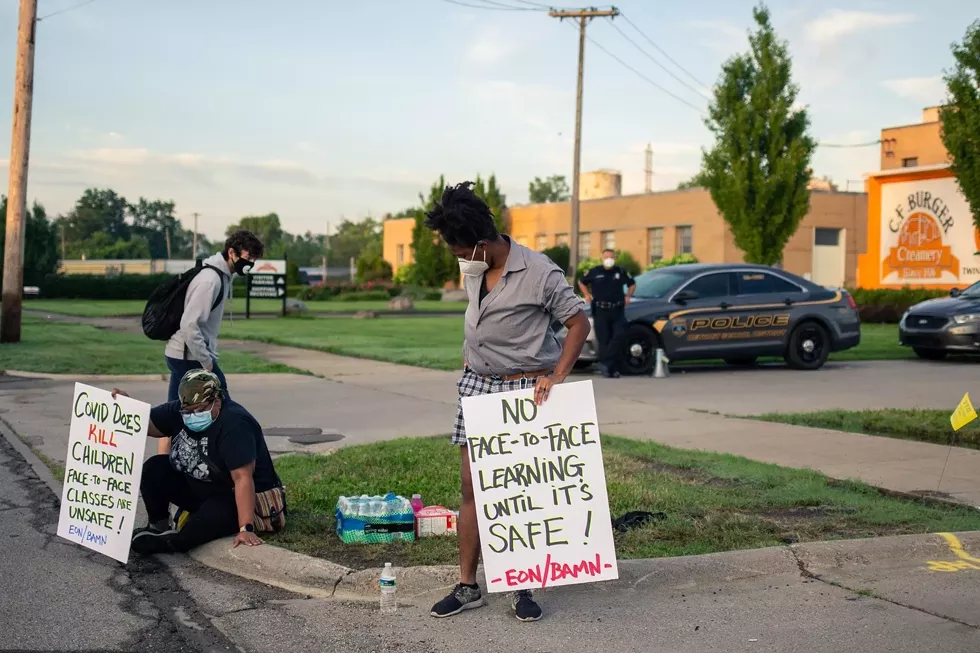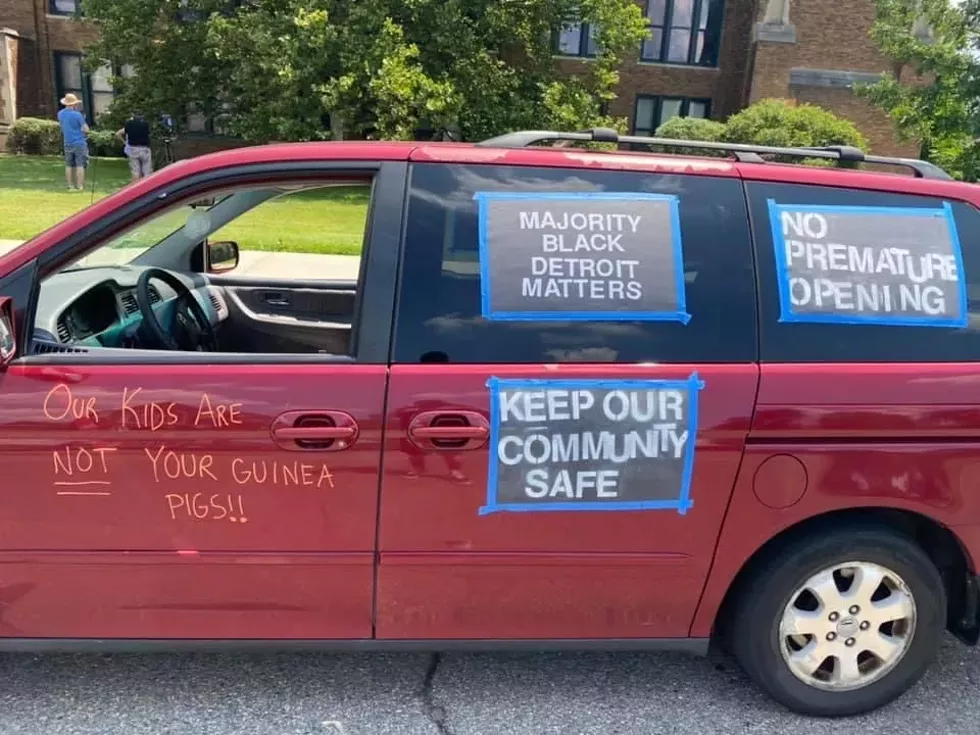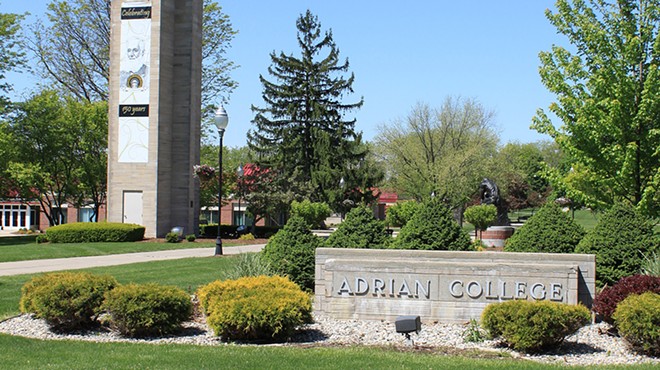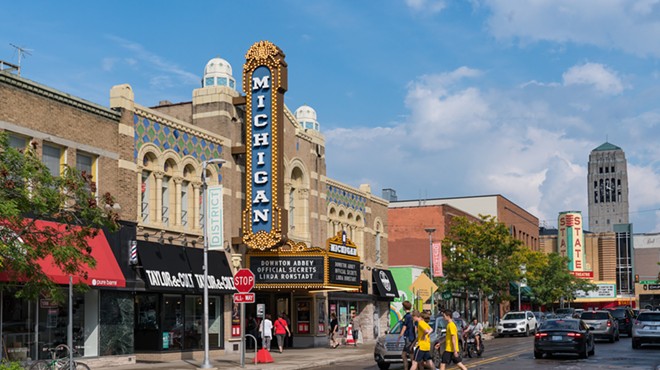
On the penultimate night of last week's Republican National Convention, Vice President Mike Pence — head of the Trump administration's coronavirus task force — set the terms for the upcoming school year.
"We're not just opening up America again — we're reopening America's schools," Pence said. "I'm proud to report that my wife, Karen, a lifelong schoolteacher, will be returning to her classroom next week."
Later, he added, "To all the heroic teachers, faculty, and staff ... You have our thanks. In the days ahead, as we open up America again and open up America's schools, I promise you we'll continue to put the health of America first."
(Shortly after the speech, Pence and President Donald Trump mingled among the tightly packed crowd, where the vast majority of people were not wearing masks. On the final night of the RNC, the crowd was even bigger, and still largely maskless.)
As to exactly how America's teachers and children will safely attend class amid a deadly pandemic that has killed more than 180,000 Americans with no signs of stopping remains to be seen.
In Michigan, officials appear to still be last-minute cramming for one of the biggest tests of their lives — despite the fact that the coronavirus crisis has been raging since March. Last month, Gov. Gretchen Whitmer and state legislators met the day before deadline to hammer out a deal that allows local school districts to decide how to proceed, providing $580 million in aid, including hazard pay for teachers.
"Today, we reached a bipartisan deal that will give students, parents, educators, and support staff much needed support, flexibility, and certainty as we approach the new school year," the lawmakers said in a statement. "They deserve peace of mind about what the next few months will hold in store, and this legislation will provide it."
Of course, how the new school year actually plays out is anything but certain.
Some schools are still determining whether they'll reopen for face-to-face classes with social distancing, opt for online-only classes taught using computers, or a hybrid of both. Last week, more than 200 faculty members from Michigan colleges and universities signed an open letter asking Whitmer to push for online learning when possible, following an outbreak at Central Michigan University where 54 students tested positive for COVID-19 within the first two weeks back on campus. (Within days, that number climbed to more than 130, prompting students to call for the school to cancel in-person classes.) And in Detroit, home of the state's largest school district and once one of the nation's top hotspots for the virus, teachers have threatened to strike, with a growing number of teachers and parents also pushing for online-only classes, though that has its own set of challenges in a city where many families are offline.
According to a study by Michigan State University (where officials pulled the plug on face-to-face learning about two weeks ago), the majority of Michigan's schools — 86% — have opted for in-person learning, offering some or all instruction in-person at the beginning of the school year. Meanwhile, 59% of Michigan school districts are offering students an option to return to school five days a week, and 27% of districts providing students with the ability to return to schools at least two to three days a week.
The hodgepodge approach mirrors the federal government's coronavirus response, which has been to largely leave it up to the individual states to decide what to do — resulting in public health officials playing a giant game of whack-a-mole, with outbreaks flaring up across the country.
Ben Royal, a fifth-grade teacher at Maybury Elementary in Southwest Detroit, has helped lead protests on behalf of Detroit teachers as part of the activist group By Any Means Necessary, including a July incident where protesters blocked buses from picking up students for summer school. The group also filed a lawsuit against Detroit Public Schools Community District to attempt to stop summer classes, and a judge ordered the district to test its summer school students.
"It's a matter of personal safety, and protecting the health and well-being of the entire community," Royal says of the protests.
Last month, Bridge Magazine reported there have been more than a dozen COVID-19 cases at Michigan's K-12 schools and colleges in recent weeks. But the state has not yet made the names of the schools where the cases were detected public, and said it would not have the information ready for several weeks — concerning parents and students who are getting ready to execute plans for the fall semester.
"That number is going to just explode after Labor Day," Royal predicts grimly. "The idea that there's a way to do this and prevent outbreaks — it's just not going to work."
DPSCD superintendent Dr. Nikolai Vitti has maintained that the district is following precautions from the Centers for Disease Control and Prevention and the state's health department. Last week, the district and its teachers union announced an agreement that would allow teachers to opt for online-only learning if they prefer. For in-person learning, classes are capped at 20 students, and classrooms have been reconfigured for social distancing, including installing plexiglass dividers between desks, moving them further apart, and placing markers and arrows on the floor. (A representative of DPSCD could not be reached for comment.)
"The Detroit (face-to-face) reopening debate needs to stop (+30 city charters offering F2F)," Vitti tweeted on Saturday. "Time to focus on serving our children through the F2F or online option they selected. Stop making DPSCD your political playground and let the playground return to children!"
The Detroit F2F reopening debate needs to stop (+30 city charters offering F2F). Time to focus on serving our children through the F2F or online option they selected. Stop making DPSCD your political playground and let the playground return to children! https://t.co/hQzOaiuvp5
— Nikolai Vitti (@Dr_Vitti) August 29, 2020
Other parents, however, agree with Royal.
"What is the big rush?" says Aliya Moore, a parent of a fifth-grader at Paul Robeson Malcolm X Academy on the city's west side and the school's PTA president. "There's such a rush to just go back to normal. This (pandemic) is not normal. We need to think outside of the box."
Moore says DPSCD reached out to parents and teachers earlier this summer for input on how to proceed. At her school, officials decided to go online-only because a critical mass of teachers refused to put themselves in danger.
Moore understands why some are pushing for the schools to reopen. Many Detroit parents have to go to work and can't be at home to look after their children, and many students have special needs and need support from their schools. Some parents may not have the patience to help their children learn, and some might not even know how to read themselves. But Moore worries that Detroit students and parents are exceptionally vulnerable to the virus, due in part to the district's decaying school facilities, which lack modern ventilation and have deteriorated for years under state control, and also due to underlying health issues in the community.
A hairdresser by trade, Moore decided to stop working when the pandemic hit, and has been able to make ends meet with unemployment payments. If she had her way, she'd just call the whole semester off until January.
"At this time, there's just so much that's unknown about this virus," she says. "In a perfect world, (Vitti's) plan would be successful, but I just don't believe that because people are still dying daily. It seems like this is now the normal, and people are willing to sacrifice people because they feel like people are going to die anyway."
She adds, "You hear people say, 'Teachers are frontline workers. They're heroes.' They are, but they didn't sign up to die."

Melissa Redman, also a parent of a student at Paul Robeson Malcolm X Academy, says she's grateful her school decided to go online-only — she's at-risk because she has asthma — but does acknowledge that her son struggled with online learning during the spring, when Vitti ordered all schools closed.
"He gets it better when it's face-to-face," she says. "He's a smart kid, but if you see it in person, and you're writing it down — those types of factors — he picks it up quicker."
There's a lot of pressure — Moore's son is trying to get into the highly competitive Cass Technical High School. She says she's willing to hire a tutor to help him, but she wishes there was a program where parents could be offered a stipend to quit their jobs and stay home to help their children learn — and also to help to slow the spread of the virus.
There are other challenges with online learning. While the school district announced a deal to provide all students with laptops and internet access to households that need it, the initial deal provides access for just six months. Moore says the district has indicated that the deal will likely be extended, but in a year of so much uncertainty, she says she'll believe it when she sees it.
Detroit has low rates of internet access, which Janice Gates says amounts to "digital redlining," a reference to the racist practice dating back to the 1930s of drawing red lines on maps to indicate poor and primarily Black neighborhoods that were deemed unsuitable for loans or development, which increased inequality. As director of the Detroit Community Technology Project's Equitable Internet Initiative, Gates has focused on getting internet access to people in underserved communities in the city. Since it was founded in 2015, the project has connected nearly 200 homes across neighborhoods in Southwest Detroit, Islandview, and the North End, with plans to expand to Highland Park.
Gates says the low rates of internet access is largely due to the low median income among residents. "Often families have to choose between — do I pay utility, or do I try to sign up for internet?" she says. "And a lot of the internet that's offered in the city is pretty unaffordable. It could be anywhere from like $50 to $80 on the high end for high-speed quality internet. I think that's just an expense that many families can't make."
Gates says that before DPSCD's deal, as many as 70% of Detroit's public school students did not have internet access, and 30% of the residents of the city at large. DPSCD has about 51,000 students.
When the pandemic hit, EII pivoted to creating hotspots in the middle of neighborhoods where people can access WiFi while still social distancing. Another solution the project came up with was "internet in a box," a ready-to-go tech bundle that can be dropped off to residents with no contact with EII workers.
Beyond school, Gates says internet access is important just for a sense of community amid a pandemic that keeps people apart.
"This is such a stressful time for everyone, and I think people underestimate how important it is for students to be able to interact with their family and their friends, even on social media," she says. "With everything that's happening in the world, I think that social interaction is really important and not being able to access the world digitally has a real negative impact on people's lives and psyche."
Meanwhile, at the University of Michigan, students who are already feeling the squeeze of tuition hikes say that if classes are going to be online only, they should cost less money.
On June 29, the school's Board of Regents approved a tuition increase of 1.9% for the Ann Arbor and Dearborn campuses, and an increase of 3.9% for the U-M Flint campus. A group of students have since started a petition called Fight Back Umich aimed at pressuring officials to lower tuition.
The tuition hike comes in addition to other surcharges, including raising housing fees, and charging all students a $50 "COVID fee," which gets them masks and a one-ounce bottle of hand sanitizer. Plus, the school will now charge international students $500, though that hike was approved last year, before the pandemic hit.
Asked for comment, Rick Fitzgerald, U-M's Assistant Vice President for Public Affairs, confirms that the university has raised tuition and fees, but points out that it also increased need-based financial aid by 5.6 percent, "more than enough to cover the entire tuition increase for in-state students with financial need on the Ann Arbor campus," he says.
Regarding the $50 "COVID fee," that will be used to partially offset the cost of COVID-19 testing, the starter kits, and other added costs because of the pandemic.
“You hear people say, ‘Teachers are frontline workers. They’re heroes.’ They are, but they didn’t sign up to die.”
tweet this
"Testing alone costs more than $100 per test," he says, adding that the school has already tested all of the nearly 7,000 undergraduates living in campus residence halls. Fitzgerald also says that housing costs were increased 1.9 percent "to meet rises in day-to-day operating costs while also supporting investments in public health measures to reduce transmission of COVID-19."
In all, the tuition spike is expected to raise about $7 million. But the students think that the school should just draw the money from its endowment, which sits at $12.4 billion as of last year.
Fitzgerald says the school is already drawing $400 million this year from the endowment. "That's more than U-M gets in its total appropriation from the state," he says. "Without this existing distribution from the endowment, tuition would be about $6,000 a year higher for all students."
Plus, Fitzgerald says, there are restrictions as to how the endowment can be used.
"It also is worth noting that the endowment actually is a collection of about 12,000 individual endowments, each with a specific purpose," he says. "When donors give money, say for a scholarship, the university cannot take the money and use it for another purpose. Donor gift agreements are legally binding on the university."
For now, the school has opted for a hybrid plan for classes, but Samantha Estrella, a third-year student and one of the petition's organizers, says that officials have told her that there's a 50-50 chance that the in-person classes even make it through the end of the semester.
"Incoming students are still looking to party, they're still looking to socialize, and live their college life. That's what they're paying for," she says.
As a theater major, Estrella believes it especially doesn't make sense for students like her to pay full tuition. "Our whole degree is based off of being with each other," she says. "So why are we paying to not be in class?"
"They keep sending us emails saying, like, 'these are unprecedented times,'" says Mary Handsome, another one of the petition's organizers and also a theater major. "But we don't really understand why they're not treating it like unprecedented times. They're just trying to continue like business as usual, but people are dying. So many people have lost their jobs. We're pretty much in a Great Depression right now, and it's not right to burden the students when they're already going through so much."
Ann Mintun, another petition organizer, says she was shocked that the school raised tuition.
"As a political science student and a history student, U-M appealed to me because of its history with activism," she says. "The first teach-in was at the University of Michigan in the '60s to protest the Vietnam War. There's such a rich tradition of activism in Ann Arbor. And so I really thought I was coming to a city and a university that was liberal and that would take care of its students."
She adds, "Since coming, I've kind of realized that Ann Arbor isn't always as liberal as everyone wants it to be."
Beyond that, the students say they worry for their health.
"I'm on Instagram pretty frequently because I don't really have anything else to do," Handsome says. "And just, like, the amount of beach pictures and people going out and partying is so disturbing to me."
At least one expert agrees."I don't know what other people's towns are like, but Ann Arbor is currently a shit show," epidemiologist and U-M Research Fellow Dr. Peter Larson tweeted on Saturday. "Expect a #covid19 cluster to happen here soon."
I don't know what other people's towns are like, but Ann Arbor is currently a shit show. Expect a #covid19 cluster to happen here soon.
— Dr. Peter Larson (@pslarson2) August 29, 2020
Royal, the BAMN activist and Detroit teacher, believes in-person learning is unfeasible given the continued spread of the virus. "The district administration spent all this time over the summer trying to find a way to convince people to come in for face-to-face teaching and learning, and reopening buildings, and things like that," he says. "But what they really needed to focus on this whole time was how to make online learning as functional as possible. And they just haven't done it."
Challenges of virtual learning aside, Royal believes everyone in charge is focusing on the wrong thing.
"The question right now is not, 'Should schools open and how do we reopen schools?'" he says. "The question is, 'How do we defeat the pandemic?' As complicated and difficult as virtual learning is, I can tell you this much, it's preferable to children dying. It is preferable to children suffering lifelong injury from this disease."
Royal says he wishes the U.S. did what other nations have done — a massive increase in COVID-19 testing and contact tracing, economic assistance to families to keep them staying home until the crisis passes, and economic assistance and protections for small businesses. "Honestly, if that had been a policy from the beginning, there's no reason to think that we would be unable to open schools this fall," he says. "That kind of policy could have contained it within three months or sooner."
What is certain is that regardless of the safety precautions, inevitably — somewhere — students, teachers, and parents will die.
"It's a scary situation," Redman, the mother, says. "It's just a fearful time right now. The only thing you can really live by right now is prayer."
Stay on top of Detroit news and views. Sign up for our weekly issue newsletter delivered each Wednesday.



